Hey YA Lovers: This week’s interview is a total treat I cannot wait to share.
“What’s Up in YA?” is sponsored by 9 Days and 9 Nights by Katie Cotugno from Epic Reads.
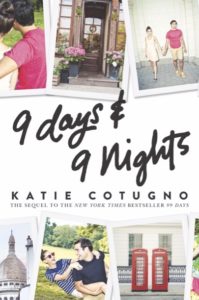 In this sequel to the New York Times bestseller 99 Days, Molly finds herself in Europe on her summer vacation with her new boyfriend Ian, desperately trying to forget everything that happened a year ago. But there on a London tube platform, the past catches up to her in the form of Gabe, her ex, traveling on his own parallel vacation with his girlfriend. And Molly and Gabe can’t bring themselves to tell the truth about who they once were to each other to their new significant others. Now Molly has to spend 9 days and 9 nights with the boy she once loved, the boy whose heart she shredded, without Ian knowing. Will she make it through, or will everything that happened between her and Gabe come rushing back?
In this sequel to the New York Times bestseller 99 Days, Molly finds herself in Europe on her summer vacation with her new boyfriend Ian, desperately trying to forget everything that happened a year ago. But there on a London tube platform, the past catches up to her in the form of Gabe, her ex, traveling on his own parallel vacation with his girlfriend. And Molly and Gabe can’t bring themselves to tell the truth about who they once were to each other to their new significant others. Now Molly has to spend 9 days and 9 nights with the boy she once loved, the boy whose heart she shredded, without Ian knowing. Will she make it through, or will everything that happened between her and Gabe come rushing back?
If you have listened to the “Hey YA” podcast at all, you know Eric and I are huge fans of author Bryan Bliss. If you aren’t a listener, here’s that said another way: I’m a huge fan of Bryan Bliss, as are many other YA readers.
One of the most frequent questions I get from readers, both here and in other venues, is about “books for boys” or “authors for boys.” I always answer the same thing: books don’t have gender, and all books are for all genders. It’s the attitude of “for boys” that holds those books back from connecting with a reader who truly needs it.
 I still 100% believe that. I also knew that after reading We’ll Fly Away, which comes out tomorrow, I wanted to angle this interview a bit to answer some of those gender-related questions in a way that makes clear there are aspects of the patriarchy that absolutely harm male-identifying people (the belief in books being gendered is one of them). Bryan was kind enough to talk with me about his new book, about what we do and don’t see when it comes to male platonic relationships, and so much more.
I still 100% believe that. I also knew that after reading We’ll Fly Away, which comes out tomorrow, I wanted to angle this interview a bit to answer some of those gender-related questions in a way that makes clear there are aspects of the patriarchy that absolutely harm male-identifying people (the belief in books being gendered is one of them). Bryan was kind enough to talk with me about his new book, about what we do and don’t see when it comes to male platonic relationships, and so much more.
You’re in for a treat.
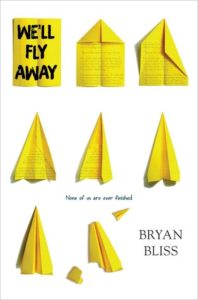 Kelly Jensen: Give us the pitch for We’ll Fly Away.
Kelly Jensen: Give us the pitch for We’ll Fly Away.
Bryan Bliss: Best friends since childhood, Luke and Toby have dreamed of one thing: getting out of their dead-end town. Soon they finally will, riding the tails of Luke’s wrestling scholarship, never looking back. If they don’t drift apart first. If Toby’s abusive dad, or Luke’s unreliable mom, or anything else their complicated lives throw at them doesn’t get in the way. We’ll Fly Away weaves together Luke and Toby’s senior year of high school with letters Luke writes to Toby later—from death row.
KJ: Your book explores the inner workings — and the circumstances leading to — a teen boy sitting on death row. What inspired this setting and story?
BB: I used to work as a newspaper reporter and I was assigned as a press witness to an execution. I saw a man put to death. This isn’t something I particularly enjoy talking about for a variety of reasons, but ever since it occurred I’ve been searching for a way to process it. I tried a number of different things – from graduate education to activism to writing letters with men on death row. All of those, individually, were deeply rewarding experiences. But I still felt an itch. I had something to say and, after close to 15 years of ignoring this story, I wrote a few pages. Honestly, I didn’t think anybody would want to publish it. A death row book for teenagers? Thankfully, my agent and editor disagreed. Now that’s it’s out there, I hope it can inspire teenagers to think about capital punishment. I hope it can break their hearts to the injustice and inhumanity and barbarism involved. If nothing else, that’s a win.
KJ: One of the things that stands out in this book is its exploration of friendship and more specifically, male friendship. What drew you to this? Why do you think we rarely see male friendship at the heart of YA novels?
BB: Friendship, for me, is the most interesting topic to write and read about in a novel. I love the shared history. I love the potential for betrayal and, naturally, the hard-won forgiveness that is baked-in when you’ve invested the time and energy into that sort of relationship. That’s all gold for a writer, especially a writer like myself who may or may not (ahem) be good at constructing epic, high concept plots. So, friendship allows me to really dive deeply into character, into the backstories—which, I think, is something I’m good at. As far as male friendship is concerned, I like having the opportunity to portray young men who are in platonic relationships. I like showing deep level of intimacy. Friendships that are self-effacing and genuine. And if I’m being honest, I like being able to write characters who float between low-brow humor and intense discussions about their fears. As to why we don’t see it? I’m not sure! But I hope there’s more of it out there, because giving young men an opportunity to see themselves as something outside of how society typically teaches them to be would probably be good for everybody involved.
KJ: Faith plays a role in this story, as well as in your other books. Can you talk a bit about the role in plays and why it’s important in We’ll Fly Away?
BB: This is going to sound strange, seeing as my first novel was literally about religion, but We’ll Fly Away is probably my most thematically religious novel. At the heart of We’ll Fly Away is the idea that nobody is beyond redemption. Nobody, no matter what they do, is a lost cause. This is core theology for me, perhaps the only thing that allows me to still play in the world of religion and faith. From the very beginning of the novel you know that Luke is guilty. That’s something that I wanted to struggle with as a writer, but also something I hope the reader will also think about as well. By the end, you know who Luke is. You know why he’s on death row. And he is 100% guilty. But does that make him a “bad” person? Does that mean we should throw him away? The epigraph from the book comes from Sister Helen Prejean and, I’m paraphrasing here, says that’s it’s easy to forgive the innocent. It’s how we treat the guilty that tests our morality. How you answer that question also determines your theology.
KJ: Another powerful aspect of We’ll Fly Away is the way both boys are growing up in tremendously difficult home lives. This book specifically looks at poverty in a way we rarely see. Can you talk a bit to this and maybe talk a bit about where you’ve seen it in your own reading of YA?
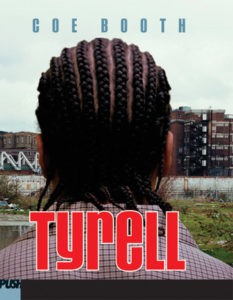 I read a newspaper article once that had the headline: “Death Row Isn’t a High-Income Neighborhood” and that, again and again, is backed up by even the most cursory glance at capital punishment. Poverty is a common denominator for those sentenced to death. This, plus my own experience growing up poor, made for an obvious connection when I started writing the book. There’s a tenuousness to living in poverty that isn’t shown in young adult literature enough. It’s a balancing act that, if disturbed, sets in motion a chain reaction of events that is nearly impossible to stop. Your entire life becomes a reaction. That’s what happens in We’ll Fly Away, but I think it’s the reality of many, many teenagers and I wanted to portray it as authentically as I could. That said, Tyrell by Coe Booth and Gem & Dixie by Sara Zarr immediately come to mind.
I read a newspaper article once that had the headline: “Death Row Isn’t a High-Income Neighborhood” and that, again and again, is backed up by even the most cursory glance at capital punishment. Poverty is a common denominator for those sentenced to death. This, plus my own experience growing up poor, made for an obvious connection when I started writing the book. There’s a tenuousness to living in poverty that isn’t shown in young adult literature enough. It’s a balancing act that, if disturbed, sets in motion a chain reaction of events that is nearly impossible to stop. Your entire life becomes a reaction. That’s what happens in We’ll Fly Away, but I think it’s the reality of many, many teenagers and I wanted to portray it as authentically as I could. That said, Tyrell by Coe Booth and Gem & Dixie by Sara Zarr immediately come to mind.
KJ: What have been some of the most influential YA reads in your life as a reader and/or as a writer?
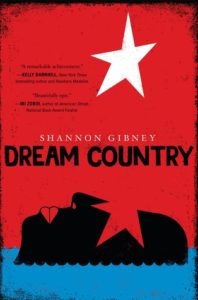 BB: As a reader, one of the first great books I remember reading was Hoops by Walter Dean Myers. That kicked off a love of Walter Dean Myers that is still present to me as a reader and a writer. I’ve read most of his books, with the major exception being Monster, only because I know it will be great and could’ve taken over my own vision for We’ll Fly Away. That said, I’m literally reading it right now. From there, I love everything Nina LaCour writes, but most recently We Are Okay absolutely killed me both as a reader and a writer. I just finished an ARC of Dream Country by Shannon Gibney and – holy crap! – it’s very, very good. Fingerprints of You by Kristen-Paige Madonia is amazing, underrated, and one of my favorites. Conviction by Kelly Loy Gilbert is another one that has stuck with me. I’m probably missing some obvious ones and it kind of stresses me out.
BB: As a reader, one of the first great books I remember reading was Hoops by Walter Dean Myers. That kicked off a love of Walter Dean Myers that is still present to me as a reader and a writer. I’ve read most of his books, with the major exception being Monster, only because I know it will be great and could’ve taken over my own vision for We’ll Fly Away. That said, I’m literally reading it right now. From there, I love everything Nina LaCour writes, but most recently We Are Okay absolutely killed me both as a reader and a writer. I just finished an ARC of Dream Country by Shannon Gibney and – holy crap! – it’s very, very good. Fingerprints of You by Kristen-Paige Madonia is amazing, underrated, and one of my favorites. Conviction by Kelly Loy Gilbert is another one that has stuck with me. I’m probably missing some obvious ones and it kind of stresses me out.
KJ: Your book is told in a bit of an alternative format — it’s both narrative and includes letters. What do you think makes books told in these alt formats appealing to readers and what are some of your favorites that you’d recommend to YA readers?
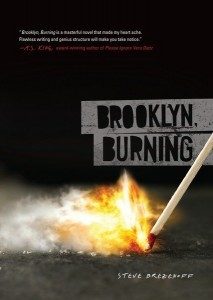 BB: I love it when a book plays around with structure. The letters in We’ll Fly Away came out of a short story I wrote during my MFA program. But it wasn’t two, three years later until I realized that story was actually the start of this novel I’d been trying to write forever. As a writer, alternate structures allow me to move around the story in a way that isn’t possible if you’re stuck in one point of view. And I think the same is true of readers, maybe? As far as other books go, I point to Steve Brezenoff’s Brooklyn, Burning and how it uses (or, actually, doesn’t use) pronouns. Jason Reynold’s Long Way Down surprised me when I first opened it, because it feels like poetry—like the form is just as important as the words. Lips Touch Three Times by Laini Taylor is unique in that it connects three short stories to a powerful overall effect. Gabi, A Girl in Pieces by Isabel Quintero was one that blew me away in both how she structured the story as well as how she used poetry. Again, stress. There’s just so many.
BB: I love it when a book plays around with structure. The letters in We’ll Fly Away came out of a short story I wrote during my MFA program. But it wasn’t two, three years later until I realized that story was actually the start of this novel I’d been trying to write forever. As a writer, alternate structures allow me to move around the story in a way that isn’t possible if you’re stuck in one point of view. And I think the same is true of readers, maybe? As far as other books go, I point to Steve Brezenoff’s Brooklyn, Burning and how it uses (or, actually, doesn’t use) pronouns. Jason Reynold’s Long Way Down surprised me when I first opened it, because it feels like poetry—like the form is just as important as the words. Lips Touch Three Times by Laini Taylor is unique in that it connects three short stories to a powerful overall effect. Gabi, A Girl in Pieces by Isabel Quintero was one that blew me away in both how she structured the story as well as how she used poetry. Again, stress. There’s just so many.
KJ: If you could go back in time to your 12 or 13 year old self and pass along one YA book, which would it be and why?
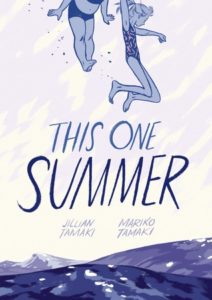 BB: I’m suddenly wishing I held back some of my previous answers, because it could easily be any of the other books I’ve mentioned. So, I’ll go with another book that I love: This One Summer by Mariko Tamaki. When I was 12-13, I was trying to figure out who I was. Trying to fight against a demeaning identity assigned to me by teachers, other kids my age. I love that graphic novel because it shows growth and transformation. It shows a kid who is changing, but still okay. And because we’re playing make believe, I’d drop a note into the book that says, “You’re not stupid, no matter what that English teacher says. But seriously. Turn in your homework, bro.”
BB: I’m suddenly wishing I held back some of my previous answers, because it could easily be any of the other books I’ve mentioned. So, I’ll go with another book that I love: This One Summer by Mariko Tamaki. When I was 12-13, I was trying to figure out who I was. Trying to fight against a demeaning identity assigned to me by teachers, other kids my age. I love that graphic novel because it shows growth and transformation. It shows a kid who is changing, but still okay. And because we’re playing make believe, I’d drop a note into the book that says, “You’re not stupid, no matter what that English teacher says. But seriously. Turn in your homework, bro.”
____________________
Thanks for hanging out this week, and we’ll be back next with a round-up of recent YA news!